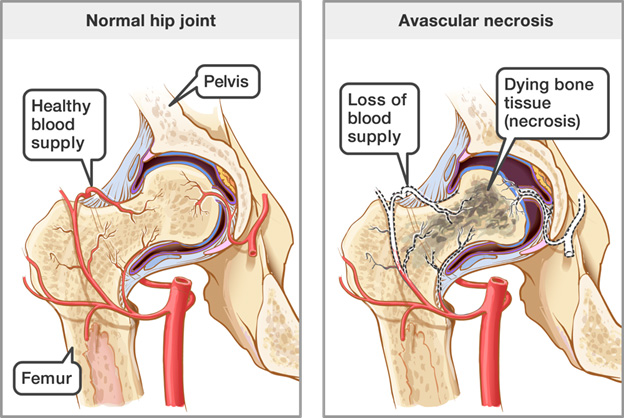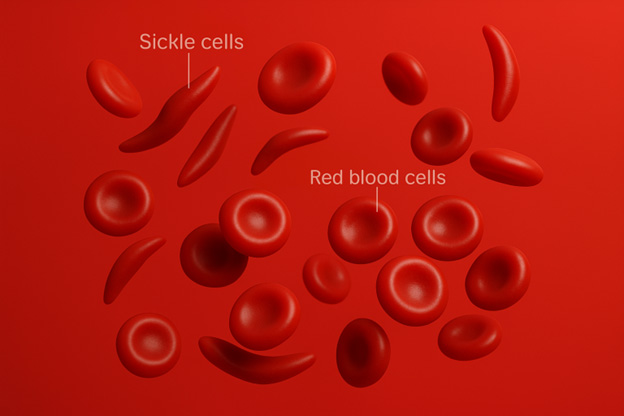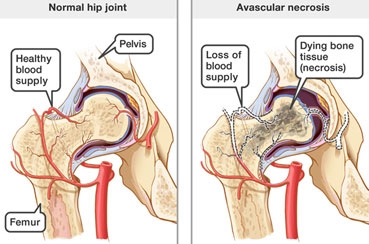Are you experiencing persistent hip pain while managing sickle cell disease? You might be dealing with a hidden complication called Avascular Necrosis (AVN)-a serious condition that can severely affect your mobility and quality of life.
AVN is particularly common in individuals with sickle cell disease due to frequent vaso-occlusive crises that disrupt blood flow to the bones. Without timely intervention, AVN can lead to joint collapse, chronic pain, and permanent disability.
Dr. Supreet Bajwa, a leading Orthopaedic and Joint Replacement Surgeon in Mumbai, explains how modern treatment techniques–including core decompression, biological therapy, and minimally invasive joint replacement-can offer lasting relief and restore mobility, especially for sickle cell patients.

What Is Avascular Necrosis (AVN)?
AVN is a condition where bone tissue dies due to a lack of blood supply. It most commonly affects the hip, shoulder, and knee joints and can be triggered by trauma, steroid use, alcohol, or blood disorders like sickle cell anemia.

Why Does Sickle Cell Disease Cause AVN?
In sickle cell patients, red blood cells become abnormally shaped and block small blood vessels. This interruption in blood flow can starve bone tissue of oxygen, leading to necrosis.
What Are the First Signs of AVN in Sickle Cell Patients?
Early symptoms include:
- Persistent pain in the hip or shoulder
- Difficulty walking or moving joints
- Pain that worsens with weight-bearing
How Is AVN Diagnosed?
Doctors use imaging techniques like:
- X-rays (for late-stage damage)
- MRI (for early-stage diagnosis)
- CT scans
- Bone scans
How Fast Does AVN Progress in Sickle Cell Disease?
AVN can progress rapidly in sickle cell patients due to recurrent blood flow blockage. In some, joint collapse may occur within 6–12 months if untreated.
Can AVN Be Reversed?
In early stages (Stage I or II), core decompression, stem cell injections, and bisphosphonate therapy can help reverse or slow progression.
What Are the AVN Stages?
- Stage I: Normal X-ray, MRI shows damage
- Stage II: Bone structure intact, but shows changes
- Stage III: Bone collapse begins
- Stage IV: Advanced joint destruction
Treatment Options for AVN in Sickle Cell Disease
Depending on the stage, treatment options include:
- Pain management
- Physical therapy
- Core decompression
- Bone grafting
- Total hip replacement
What Is Core Decompression?
This is a minimally invasive surgery where small holes are drilled into the bone to relieve pressure, improve blood flow, and stimulate healing.
Does AVN Affect Children with Sickle Cell Disease?
Yes. AVN can begin in adolescence, affecting bone growth and joint development. Early diagnosis and non-surgical management are crucial.
What Happens If AVN Is Left Untreated?
If untreated, AVN leads to:
- Complete bone joint collapse
- Debilitating pain
- Loss of mobility
- Need for major surgery
When Is Joint Replacement Needed?
When AVN reaches Stage III or IV, and conservative treatments fail, hip replacement becomes necessary. In sickle cell patients, this improves function and drastically reduces pain.
How Successful Is Joint Replacement in Sickle Cell Disease?
Modern techniques like minimally invasive and cementless implants improve outcomes. Dr. Supreet Bajwa has successfully treated multiple sickle cell patients with long-lasting results.
What Lifestyle Changes Help?
- Avoid alcohol and smoking
- Stay hydrated to reduce sickling
- Maintain a healthy weight
- Regular follow-ups with your orthopaedic surgeon
Dr. Supreet Bajwa’s Approach to AVN in Sickle Cell Disease
Dr. Supreet Bajwa, Fellowship-Trained Hip & Knee Orthopaedic Surgeon, specializes in treating complex cases like AVN in sickle cell disease using cutting-edge techniques:
- Minimally Invasive Joint Replacement
- Robotic Knee and Hip Surgery
With training from Sunshine Coast Orthopaedic Group, Australia, and over 1300+ successful surgeries, Dr. Bajwa practices at:
- Wockhardt Hospital (Mumbai Central & Mira Road)
If you or someone you know has sickle cell disease and is experiencing joint pain-especially in the hip or shoulder-seek immediate medical attention. AVN is treatable, especially when caught early.
For long-term mobility, pain relief, and expert care tailored to your needs, consult Dr. Supreet Bajwa, a trusted name in advanced orthopaedic care.
Contact: +91 9820727046
Book an Appointment Today


